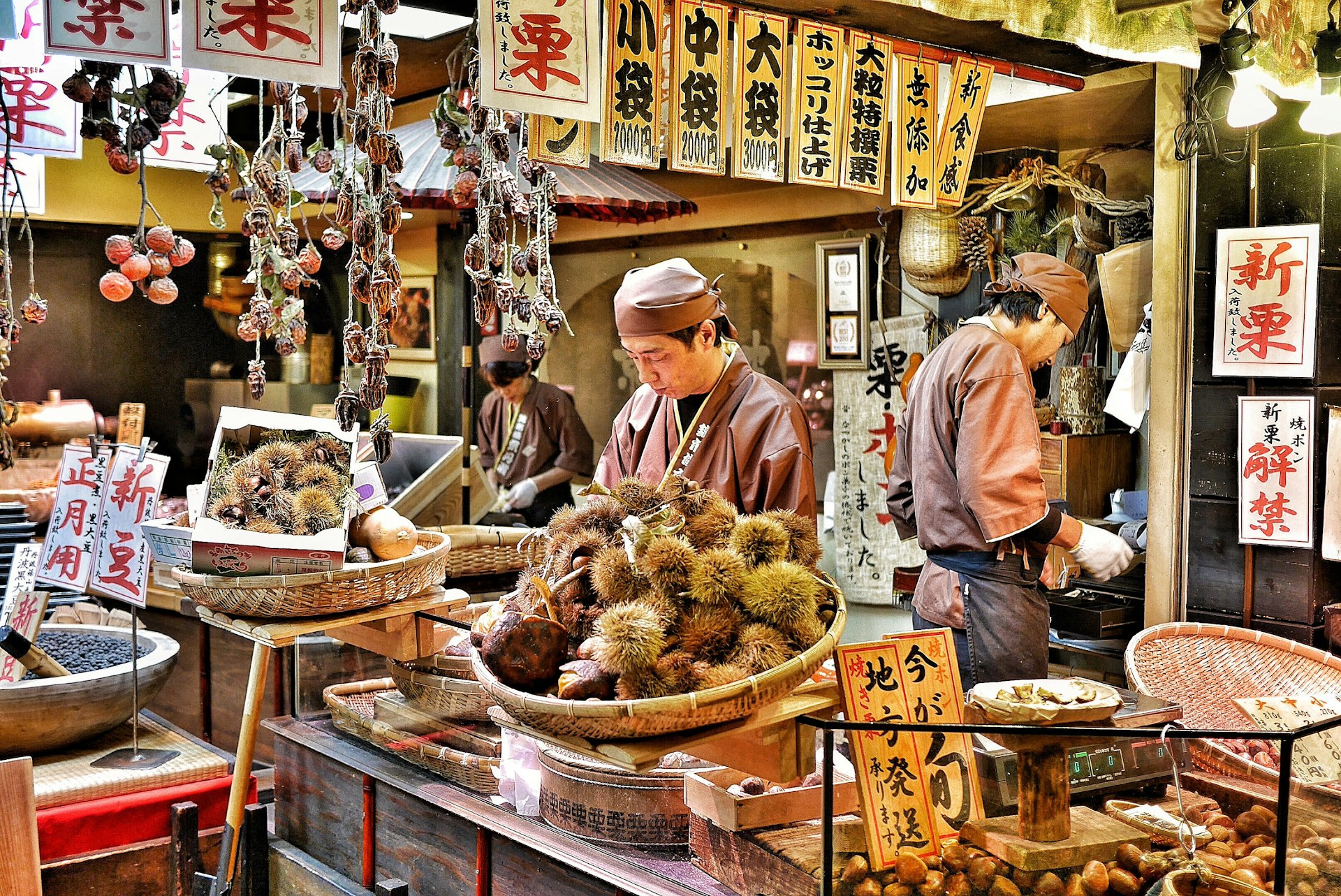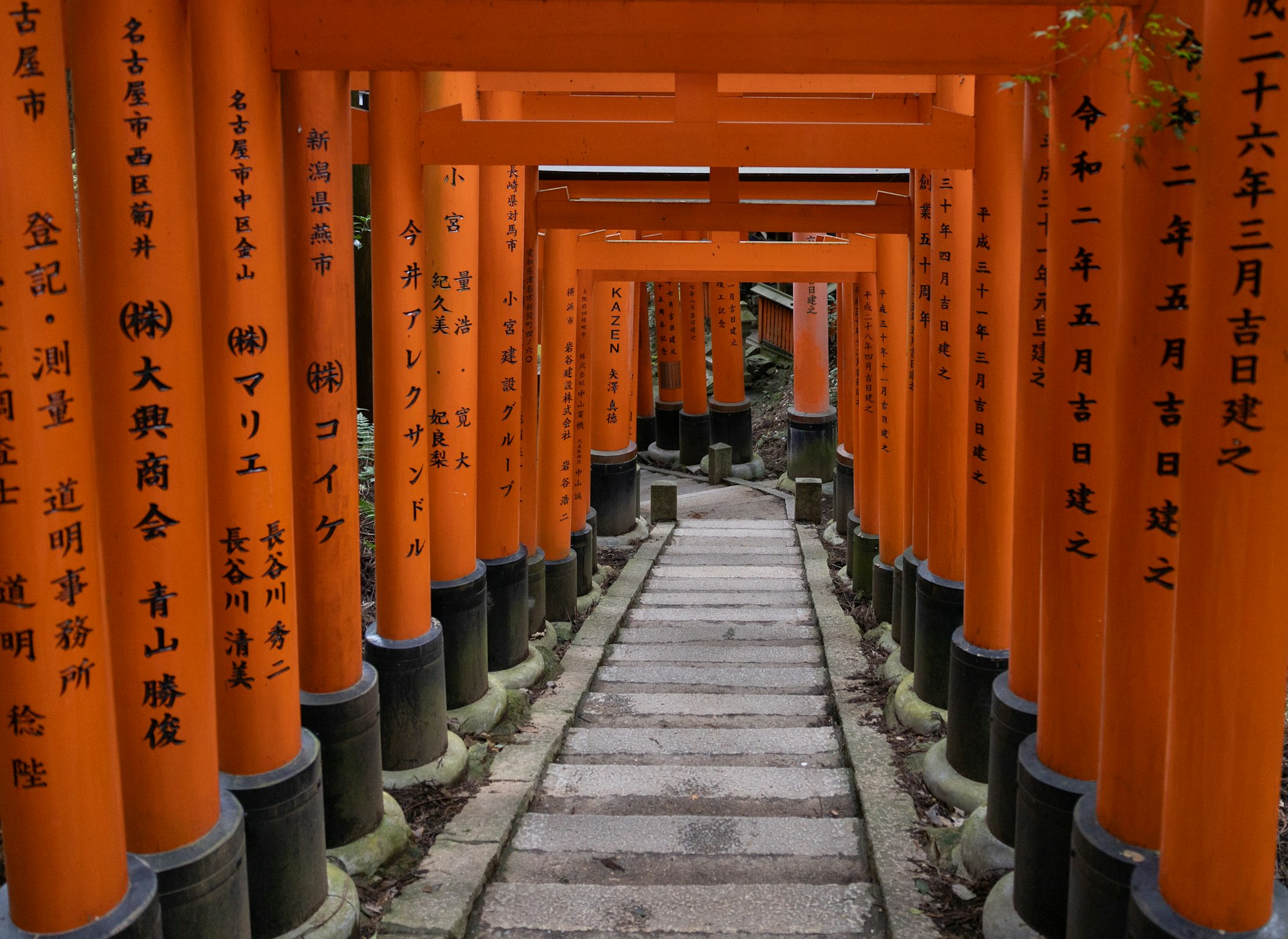Known as one of the historical hubs of Japan, Kyoto has a notable number of well-preserved neighborhoods, majestic temples and all manner of photo-worthy landscapes.
But getting to know the city’s abundant heritage doesn’t have to break the bank. Here are the best things to do for free across Kyoto.
1. Get your steps in at Fushimi Inari-Taisha
The 10,000 vibrant orange torii (gates) snaking up the hill at Fushimi Inari-Taisha double as both the ultimate photo op and a notable exercise opportunity. Walking the entire loop takes two to three hours – or more if you stop to enjoy the numerous fox statues – however, it’s worth making the climb if your goal is a photo-op without the crowds that usually fill up the lower levels.
Planning tip: Visit at daybreak for a more restful experience, when the local monks are making their way up the hill to work and the resident cat population is out to play.
2. Stroll the Path of Philosophy
About 2km long (1.2 miles), the Path of Philosophy winds through the Higashiyama district, linking Ginkaku-ji (aka Silver Pavilion) to the Nanzen-ji neighborhood. The canal-side walkway is particularly popular during spring and fall, with sakura (cherry blossoms) and autumn colors transforming the lane into a surreal wash of color.

3. Nibble on free samples at Nishiki Market
Also known as “Kyoto’s Kitchen,” the five-block collection of over 100 restaurants and shops at Nishiki Market is the perfect place for sampling local specialties, including pickles, tea, crackers and fish.
Planning tip: It’s best to come in the morning – the early bird gets the snacks.
4. Visit the Kyoto Museum of Traditional Crafts
Also known as Fureai-kan, the Kyoto Museum of Traditional Crafts provides an excellent knowledge base for anyone curious about traditional Japanese handicrafts, including wood carving, fabric dying and fan creation.
Planning tip: Check the schedule – on weekends, it often has in-house sessions where artisans demonstrate the steps behind creating beautiful one-of-a-kind items.
5. See geiko as you stroll through Gion District
Geisha, or geiko as they’re called in Kyoto, are one of the city’s icons (check out their images on the area’s legion of vending machines). These face-paint-adorned, kimono-wearing skilled hostesses and entertainers are usually employed in Gion neighborhood, a collection of narrow, atmospheric streets filled with teahouses and tiny restaurants.
Planning tip: To possibly spot a geiko on her way to work, go for an atmospheric sunset stroll just as the lanterns are lit for the evening (just remember to be respectful and avoid taking photos without consent).

6. Join a hanami party when the cherry blossoms are in bloom
During sakura season, locals participate in hanami, or blossom-viewing parties. To get in on the action, take a stroll through Maruyama-kōen, located just next to Yasaka Shrine, when the koi-pond-dotted expanse transforms into a sea of pink.
Planning tip: Make a picnic out of it by stopping at the local FamilyMart for low-cost, high-quality egg sandwiches, pork buns and onigiri (rice-ball snacks), and enjoy them under the famed Gion Weeping Cherry Tree.
7. Cool off by the Kamo River
When the weather gets hot, locals head for a walk along the Kamo River. It’s a prime place to spot the herons, egrets and cranes that call the area home, and crowds tend to naturally thin out, adding to the sense of space.
Planning tip: This is the perfect place to enjoy a vivid sunset, just grab a seat on the banks and relax – there really isn’t a bad viewing location.
8. Visit Yasaka Shrine after dark
The guardian shrine of Gion, Yasaka-jinja is a hub of regular activity. For the full effect, visit after dark, when the lanterns give the complex an otherworldly glow.
Planning tip: During the Gion Matsuri festival in July, the temple hosts massive floats in a parade tradition that dates back over 1000 years.

9. Explore Arashiyama Bamboo Grove
Located in the Western Kyoto district of Arashiyama, the Arashiyama Bamboo Grove is one of the most famous places in the world to hear the sound of the wind in the bamboo. It’s also one of the most photographed places in the city. Just remember – if you’re looking for an experience that’s more zen than “packed in with friends,” be sure to visit at sunrise.
Planning tip: There’s so much more to see in the area. Once you’ve had your bamboo fix, take a stroll along the Katsura river for a taste of Kyoto’s incredible natural landscapes.
10. Picnic in the grand Kyoto Imperial Palace grounds
As an official residence of the royal family, the buildings of the grand Kyoto Imperial Palace are off-limits. However, visitors are free to roam the grounds, including the park – a prime picnic location.
11. See the monsters of Ichijo-Dori
In many ways, Ichijo Dori looks like an average Kyoto thoroughfare – until you realize that almost every business on the street is guarded by a monster, giving the street the nickname “Yokai” (ghost, demon or monster). Each creature was handmade by the business it protects.

12. Wander through Higashiyama district
Located at the foot of Kyoto’s eastern mountains, just below Kiyomizu-dera, is Higashiyama, a historic district full of shrines, temples and well-preserved wooden houses (yes, that’s a Starbucks with tatami mats on the street Masuyacho). Be sure to grab a photo down the street from Yasaka and on the Sannenzaka stairs, both beloved Kyoto landmarks.
13. Stretch your legs on a hike between Takao and Hozukyo
The path between Takao Hozukyo is regularly considered one of the city’s best hikes. Follow the path along the Kiyotaki River to Kuya-no-Taki waterfall for a scenic 11km (7-mile) adventure that can easily be completed in one day.
14. Tell no lies at Shimogamo-jinja
Believers consider the 2000-year-old shrine of Shimogamo one of the most sacred in the city. It sits between the Kamo and Takano Rivers, a sacred spot surrounded by the Tadasu-no-mori (ancient forest), where it’s said that all lies will be revealed.
15. Take a break at Kamigamo-jinja
Another gem in Kyoto’s collection of sacred Shinto shrines is Kamigamo-jinja, located just a few kilometers up the road from Shimogamo-jinja. Be sure to stop by the two large tatesuna (sand pyramids) in front of the main hall, which are believed to be the spot where deity Kamo Wakeikazuchi no Okami first came to earth and are considered to have a purifying influence.
